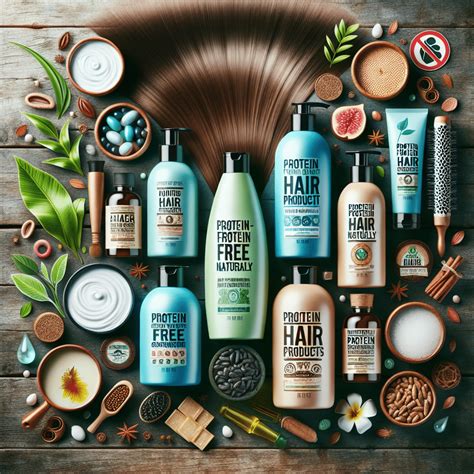Understanding Protein
Protein is an essential nutrient that plays a crucial role in the health and structure of hair. It consists of amino acids, which are the building blocks that form hair strands. Adequate protein intake ensures strong, resilient, and healthy hair.

The Importance of Protein for Hair Health
1. Strength and Elasticity: Protein provides structural support to hair strands, making them stronger and less prone to breakage. It also enhances elasticity, allowing hair to stretch and return to its original shape without damage.
2. Moisture Retention: Amino acids in protein act as humectants, attracting and retaining moisture within the hair shaft. This helps keep hair hydrated and prevents dryness and frizz.
3. Cuticle Protection: Protein forms a protective layer on the hair cuticle, the outermost layer of the hair strand. This layer shields the hair from environmental aggressors such as UV rays, pollutants, and heat styling.
Signs of Protein Deficiency in Hair
1. Breakage and Split Ends: Brittle hair that breaks easily and develops split ends is a common sign of protein deficiency.
2. Dryness and Frizz: Lack of protein can lead to dry, coarse hair that is prone to frizz and tangles.
3. Lack of Shine: Healthy hair reflects light, giving it a natural shine. Protein deficiency can dull hair and make it appear lackluster.
How to Get More Protein for Hair
Dietary Sources:
- Lean meats (chicken, fish, tofu)
- Dairy products (milk, yogurt, cheese)
- Eggs
- Beans and lentils
- Whole grains
Hair Care Products:
- Protein-rich shampoos and conditioners
- Leave-in protein treatments
- Hair masks with protein ingredients
Different Types of Protein for Hair
1. Hydrolyzed Protein: Broken down into smaller molecules for better absorption by the hair.
2. Keratin: A structural protein naturally found in hair; repairs damage and restores strength.
3. Collagen: Another structural protein that promotes elasticity and moisture retention.
Protein Treatments for Hair
1. Protein Hair Mask: Apply a protein-based hair mask to wet hair and leave it on for 15-20 minutes before rinsing. This helps repair damage and restore moisture.
2. Protein Spray: Use a protein spray after washing and conditioning hair. It adds a layer of protection and enhances shine.
3. Protein Shampoo and Conditioner: Incorporate protein-rich shampoos and conditioners into your regular hair care routine to consistently nourish your hair.
Tips and Tricks for Optimal Protein Absorption
- Combine protein treatments with moisturizing treatments to prevent over-drying.
- Avoid using excessive heat styling, as this can damage protein bonds.
- Protect hair from UV rays with a hat or scarf.
- Incorporate protein-rich foods into your diet for overall hair health.
Pros and Cons of Protein for Hair
Pros:
- Strengthens and repairs hair
- Reduces breakage and split ends
- Enhances elasticity and moisture retention
- Protects hair from damage
Cons:
- Overuse can lead to dryness and brittleness
- Not suitable for all hair types (e.g., fine or color-treated hair)
Conclusion
Protein is essential for maintaining healthy and strong hair. By incorporating adequate protein into your diet and hair care routine, you can nourish your locks from the inside out, ensuring their beauty and resilience.
